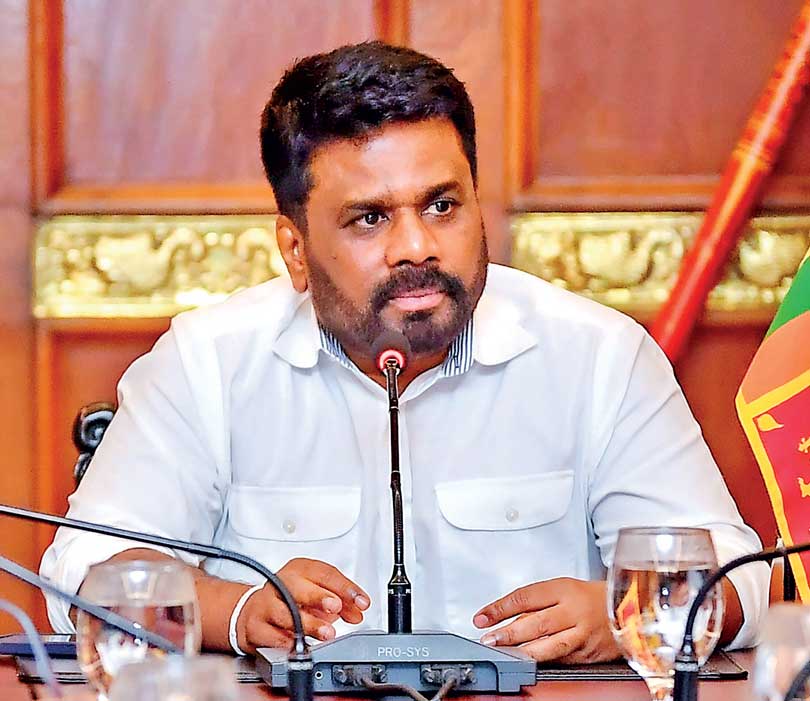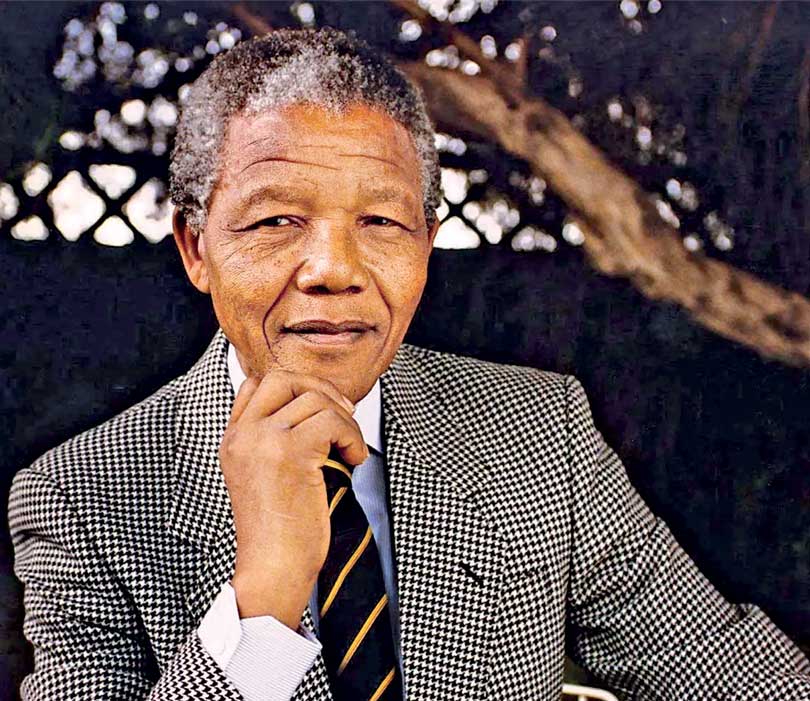Friday Feb 20, 2026
Friday Feb 20, 2026
Tuesday, 3 December 2024 00:02 - - {{hitsCtrl.values.hits}}

President Anura Kumara Dissanayake

Nelson Mandela
AKD has an eye for detail, an appreciation for clear systems, processes and procedures, a focus on timelines, a dislike for surprises and a desire for order. Discipline and order are not traits which are usually highlighted in discussions on leadership. Self-discipline, routine, structure and an attention to detail are highly beneficial to any leader. Self-disciplined leaders are well positioned in helping colleagues and teams understand their goals and showing them, what success looks like. The ability of a self-disciplined leader to sift through clutter and chaos, spot errors and to bring structure to processes provides a base for high performance
Whilst I acknowledge that it is very early days of the AKD regime and therefore comparison with a world renowned great is unfair and premature, AKD displays glimpses of the traits and behaviours of Nelson Mandela who, through his exemplary life and leadership, changed the course of history of his native South Africa and became a role model to the whole world. Mandela was an extraordinary leader, and he was blessed with a high quotient of emotional intelligence. It was such emotional intelligence which powered the significant, cult-like, influence he wielded over his followers. It was an influence which he used judiciously and effectively in the interest of the people he served
 If Anura Kumara Dissanayake’s (AKD) win at the Presidential elections in September 2024 could be described as comfortable, then the victory of the AKD led National People’s Power (NPP) at the General elections in November 2024 must be described as incredible. The two victories signalled, unambiguously, the overwhelming acceptance of AKD by the voting masses of Sri Lanka as the messiah of a country steeped in bribery and corruption, reeking from the disgusting odours of the unequal application of the law, wallowing in nepotism, cronyism and poor governance practices and struggling to recover from the vicissitudes of poor economic mismanagement.
If Anura Kumara Dissanayake’s (AKD) win at the Presidential elections in September 2024 could be described as comfortable, then the victory of the AKD led National People’s Power (NPP) at the General elections in November 2024 must be described as incredible. The two victories signalled, unambiguously, the overwhelming acceptance of AKD by the voting masses of Sri Lanka as the messiah of a country steeped in bribery and corruption, reeking from the disgusting odours of the unequal application of the law, wallowing in nepotism, cronyism and poor governance practices and struggling to recover from the vicissitudes of poor economic mismanagement.
The resurrection of AKD from the lows of the Presidential elections of 2019 and the incredible performance of the NPP compared to its dismal showing at the General elections of 2020, make AKD an interesting case study on leadership traits and behaviours and leadership style.
AKD’s triumphs reaffirm my contention that Emotional Intelligence (EI) is more important than technical prowess in leadership. From the facts available and from what I perceive, infer, see, touch and feel, AKD is super-endowed with EI and that is what enabled him to craft messages and exhibit a leadership style which tugged at the heart strings of the voting masses.
EI is a multifarious ability which enables individuals to be self-aware of their emotions and through such self-awareness be aware of another person’s emotions too. An individual rich in EI can effectively modulate his/her emotions and understand the emotions of others in creating an environment of participation, democracy, collaboration, and team spirit.
Emotional Intelligence
EI compromises of five core components, namely: * Self-awareness, which involves the recognition and understanding of one’s own emotions, strengths, weaknesses and limitations in responding to an event and in making situationally appropriate conscious decisions, * Self-regulation, where individuals, based on their awareness of themselves, avoid compulsive behaviour and portray a state of emotional stability by maintaining their composure even under pressure, * Motivation, where intrinsic and latent desires are ignited in pursuing meaningful goals and in maintaining a positive outlook in good times and bad times, * Empathy, being the wonderful ability to recognise, and understand the feeling of others and through such ability be able to respond appropriately and sensitively to another’s needs, foster genuine connections, facilitate effective communication and promote inclusivity, and * Social skills which enable conflict resolution, and collaboration, adeptness in communication and the creation of high-performing and cohesive teams based on trustful relationships.
AKD’s high EI was very instrumental in building trust with his followers and constituents. His messages were, and are, laden with honesty and transparency and this has been key in winning the hearts and minds of many voting citizens, enhancing empathy rich interpersonal relationships and in inspiring a shared vision which addresses, and caters to, the needs of all Sri Lankans. Studies confirm that EI rich leaders are effective in creating supportive work/social environments and in fostering citizen engagement and productivity. Undoubtedly, AKD’s EI helped him to establish strong connections with the public, inspire and motivate followers, navigate complex social dynamics, and manage people skills empathetically and judiciously.
Glimpses of traits and behaviours of Nelson Mandela
Whilst I acknowledge that it is very early days of the AKD regime and therefore comparison with a world renowned great is unfair and premature, AKD displays glimpses of the traits and behaviours of Nelson Mandela who, through his exemplary life and leadership, changed the course of history of his native South Africa and became a role model to the whole world. Mandela was an extraordinary leader, and he was blessed with a high quotient of emotional intelligence. It was such emotional intelligence which powered the significant, cult-like, influence he wielded over his followers. It was an influence which he used judiciously and effectively in the interest of the people he served.
Mandela was incarcerated for 27 years for his involvement in the struggle to end apartheid and establish a democratic South Africa, while AKD had to disappear underground in avoiding arrest for his involvement in the brutal uprising of the Janatha Vimukthi Peramuna (JVP) in the late eighties in its attempt to convert Sri Lanka to a socialist state. Déjà vu! – is it? Just as it was for Mandela when he assumed the leadership of South Africa, there were many detractors of AKD, particularly in the cocktail circles of Colombo, who predicted that AKD would usher in an age of Marxism, ultra socialist economic policies and even bloodshed. That did not happen, and my sense is that it will not happen in the immediate future either. AKD, unlike his predecessors, loves his country more than himself. Therefore, he will do what is right for the country.
AKD’s spartan upbringing and early life experiences have shaped his perspective of Sri Lanka’s society. This contributes, heavily, to the authenticity which AKD radiates per his communications and austere lifestyle. AKD’s simplicity buttressed by his humble beginnings anchors his excellent understanding of the needs of the masses and in magnifying the sincerity and credibility of his message, a message which, in the main, emphasises the need to adopt a system of governance which promises equality of opportunity to all citizens irrespective of ethnicity, caste, race or creed.
AKD’s image as an authentic person
The absence of a ‘walauwa (mansion) image’ and the condescending attitude as picturised by Ranil Wickremesinghe (RW), the avoidance of the ‘middle of the road’, ‘trying to please everyone’ strategy of Sajith Premadasa and the non-portrayal of the swagger of the Rajapaksas have contributed to enhancing AKD’s image as an authentic person sincere in his attempts to bring sanity and rationality to the crazy governance styles, nepotism and systemic cronyism adopted by Sri Lanka’s leaders in the past half century. Born to a father, an agricultural worker, and a mother, a homemaker, who provided him with the basics of life and having spent his young life in the unsophisticated surroundings of Thambuththegama and having been actively involved in a brutal uprising which strived to establish socialism in Sri Lanka, AKD did not have a lineage to showcase nor did he attempt to ape the styles of his opponents in endearing himself to the masses.
His utterances reflect the simplicity of his lifestyle and the immense pride he has in being brought up by values-driven, honest, hardworking parents who made ends meet through the sweat of their brow and the toil of their limbs. His message was congruent with his past and his station in life and was rich in authenticity both in terms of content and who was delivering it. RW, with his elitist background and ‘nose up’ mannerisms would never be able to exude authenticity in declaring his concern for the ordinary people.
Simple and focused message
The ability to communicate with clarity, influence and impact is the key which unlocks the door to a leader’s success and AKD did this most effectively in securing his election victories. As stated earlier, his message was simple and focused i.e. apply the law equally, create a level playing field, terminate practices which add no value to the economy, root out corruption, stop nepotism and cronyism, create a level playing field for all citizens, align expenditure with revenue and factors essential for economic growth and social stability and create a parliamentary and governance protocol which benefits the masses. He stuck to this message through thick and thin and he did not get baited by the denigrating comments made about him by his opponents.
AKD’s opponents were slow in comprehending that most of the voting citizens of Sri Lanka were not interested in knowing the complexities of debt restructuring and other financial manoeuvres but were only seeking the comfort of knowing how the candidates were planning to satisfy their aspirations. AKD cottoned on to it quite quickly and he provided the answers in very basic terms. While there is no denying that these are early days and the proof of the pudding is in the eating, the simple and credible actions which AKD and NPP took between the presidential election and the general election matched AKD’s presidential election rhetoric and highlighted his street smartness.
The outcome was an increase of the AKD/NPP votes from 5,634,195 in the first round of Presidential elections to 6,863,186 votes in the General election despite the significantly lower turnout at the General election. The bedrock of effective communications is intention and clarity and leaders who blend such with a sincerity of purpose always have the knack of choosing the right words in conveying their message with positive effect.
Although AKD has been involved in parliamentary politics since 2000, he has never been under the spotlight other than on few occasions in a brief period when he was Minister of Agriculture, Livestock, Land and Irrigation in the joint SLFP-JVP Cabinet in 2004. Therefore, there is inadequate anecdotal evidence in assessing the strength of his self-discipline and order. However, in the 11-week period since becoming President, AKD has given us glimpses of a strong sense of self-discipline and order. For example, there were no firecrackers or excessive celebrations when AKD won the presidential election and the NPP won the general election. One requires significant self-discipline in restraining the natural urge of party members to go wild in expressing the joy of victory. The power which AKD wielded within his party in curbing this natural celebratory inclination of 5.6 million supporters at Presidential election time and 6.9 million supporters at General election time is an indication of the respect the followers have for AKD’s own self-discipline. Discipline at lower levels is only possible when the tone from the top matches the self-discipline at the top.
Self-disciplined leaders
AKD has an eye for detail, an appreciation for clear systems, processes and procedures, a focus on timelines, a dislike for surprises and a desire for order. Discipline and order are not traits which are usually highlighted in discussions on leadership. Self-discipline, routine, structure and an attention to detail are highly beneficial to any leader. Self-disciplined leaders are well positioned in helping colleagues and teams understand their goals and showing them, what success looks like. The ability of a self-disciplined leader to sift through clutter and chaos, spot errors and to bring structure to processes provides a base for high performance.
Self-disciplined leaders with an eye for order are dependable and usually show great resilience in sticking to their decisions and achieving their goals. They focus on what is important and do not get sidetracked easily. From team members’ perspective this is particularly important because they will have absolute clarity in knowing what is expected of them. Although there is a school of thought which opines that self-disciplined people are control freaks, AKD has not displayed such extremes up to now. He is balanced, composed and calm in most situations.
I guess I would not be too off the mark if I assume that Che Guevera is one of AKD’s leadership models. Che Guevera (Che) was a great strategist. One of Che’s greatest strengths was his ability to inspire and unite people from diverse backgrounds. Through effective communication and charisma, he was able to rally individuals around a common goal and, create a sense of unity and purpose among his followers. By empowering those around him and instilling a sense of shared mission, Che Guevara was able to mobilise a movement that would go on to change the course of Cuba’s history. Isn’t AKD doing the same? Had Che Guevera been on the right side of the Americans and its cronies, he would be viewed today as a hero for his commitment to social justice, anti-imperialism and fight against poverty. Whether Che Guevera is viewed as good or bad largely depends on one’s own values about revolution, governance and social change. AKD and the NPP are attempting to do just that through the power of the ballot as opposed to the power of the bullet. History will tell us whether AKD was good or bad for our country.
NPP’s great visionary, marketing and organising skills
This analysis would not be complete without a mention of the great visionary, marketing and organising skills of the NPP. Sensing the public’s disapproval and distaste of the self-centred governance practices of the established parties such as the United National Party (UNP) and the Sri Lanka Freedom Party (SLFP) and of their ‘mirror’ children such as the Sri Lanka Podujana Peramuna (SLPP) and the Samagi Jana Balawegaya (SJB), the NPP crafted a political blueprint/roadmap in 2020. As a first step, it created an extensive network driven by the people for the benefit of the people. While this network was gathering momentum, the shortage of basics such as fuel and gas and the declaration of Sri Lanka as a bankrupt nation gave an early opening for the NPP to mobilise the people in a non-violent uprising called the ‘Aragalaya’.
The ‘Aragalaya’ was a peaceful movement with a Gandhian flavour until its infiltration by persons and groups with different motives. Having steadily heightened the public’s awareness of the damaging effects of bribery and corruption, unequal application of the law, nepotism and cronyism, the absence of a level playing field particularly for those lacking political connections and excesses of the current and past rulers, the NPP strategy was beginning to bear fruit.
Unlike in the past, the NPP waited patiently for a people mandated election. Before and during, campaigning time, it was common to see groups of young educated NPPers going from house to house asking the masses about their concerns and seeking their ideas. A database of issues and ideas was created. NPP’s branding and communication strategy relied heavily on this database and was therefore data driven. Contrary to the beliefs of some, the NPP is a highly disciplined organisation.
Servant leadership or transformational leadership?
At this juncture, it is difficult to say whether AKD is adopting a style of servant leadership or transformational leadership. The main difference between servant leadership and transformational leadership is that servant leaders focus on developing individuals, while transformational leaders focus on inspiring followers to work towards a common goal.
Transformational leadership is usually characterised by charisma, vision, and influence and opts for change, innovation, and excellence over stability, tradition, and adequacy. They challenge, inspire, and empower their followers to reach their full potential, and to contribute to the greater good. While this style may be effective in situations that require vision, passion, and performance, it can also lead to unrealistic expectations, stress and burnout among followers.
Servant leadership, on the other hand, is based on empathy, authenticity, and listening. Servant leaders seek to empathise with the needs, feelings, and aspirations of their followers, and to be authentic and transparent in responding to such needs. Servant leaders value listening, understanding, and relationship over charisma, vision, and influence.
Notwithstanding his style, I believe Sri Lanka is on the cusp of a new beginning under AKD. My gut tells me that he will be Sri Lanka’s Mandela in caring for his countrymen and countrywomen. AKD must just stay the course. We, the citizens, must give him the space and time.
(The writer is currently a Leadership Coach, Mentor and Consultant and boasts over 50 years of experience in very senior positions in the corporate world – local and overseas. www.ronniepeiris.com)